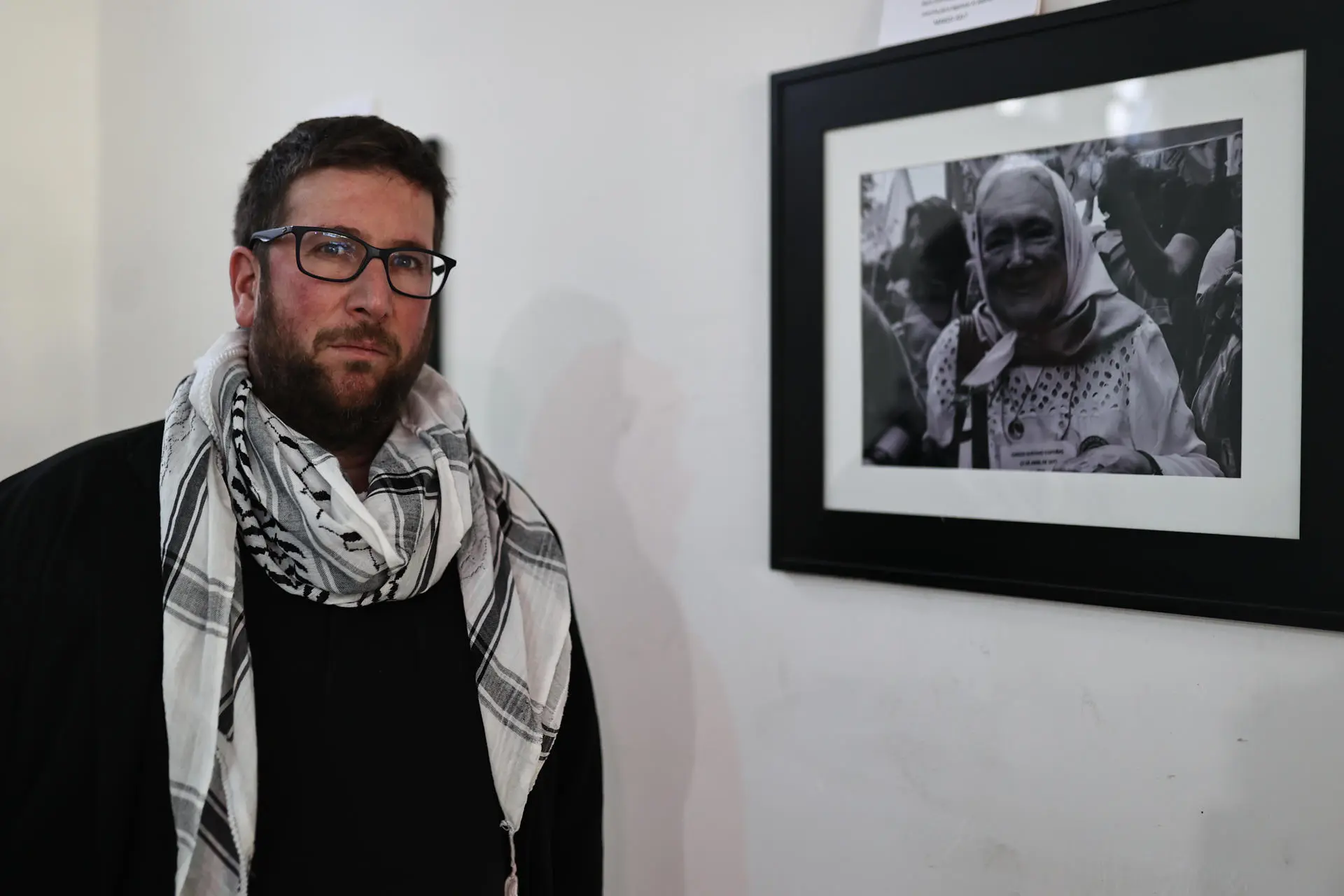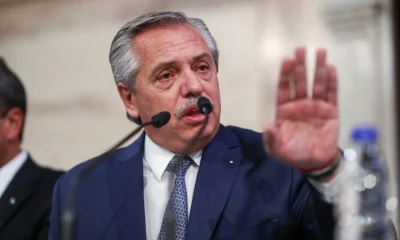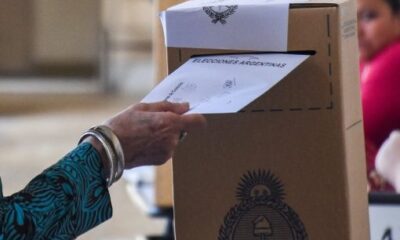International
MEP Miguel Urbán charges Milei for questioning the historical memory

Spanish MEP Miguel Urbán considers that the Government of Argentina, headed by the ultraliberal Javier Milei, and other far-right-wing Executives of the world seek to question the policies of historical memory so that the flame of the struggle of the present cannot be ignited in the reading of the past.”
“It is a common feature and a deliberate attack on what the democratic foundations would be,” says in an interview with EFE in Buenos Aires, this member of the European Parliament since 2015, a central figure of the Anti-Capitalist political organization – which was integrated into Podemos from its foundation until 2020 -, and author of the essay ‘Trumpisms’.
Urbán, son of a communist militant tortured during the Franco dictatorship (1939-1975) by the policeman Antonio González Pacheco, better known as ‘Billy el Niño’, is in the Argentine capital to, among other reasons, accompany other victims grouped under the so-called ‘Argentine complaint’ against the crimes of the Franco regime.
In addition, this Sunday he will participate in the mobilization that will take place in Buenos Aires within the framework of March 24, Day of Remembrance for Truth and Justice, in which the victims of the last Argentine military dictatorship (1976-1983) are commemorated, on the anniversary of the coup d’état that overthreuched the democratic powers of the South American country.
The Government of Milei – and particularly the vice president, Victoria Villarruel, with family ties with the military and accused of ‘denialism’ of the crimes of the dictatorship by associations that defend human rights in Argentina – has been equidistant with this symbolic day.
“Obviously we are witnessing a questioning of memory as a questioning of democracy,” says Urbán, who considers that this type of policy is the same as those used by other far-right leaders in the world, such as the Portuguese André Ventura, leader of the Chega! party, or the Spanish Santiago Abascal, president of Vox.
Urbán attributes this trend to the “element of the cultural battle”, usually argued by reactionary leaders to position himself “against the ‘cowardly right’ that does not question the ‘progressive dictatorship’.”
The MEP thinks that Milei is nothing more than “the Argentine decline of this global reactionary wave” that he describes in his latest book and that he presented this Friday in Buenos Aires.
“These phenomena start from eating the political space of the international right (…) Milei could not have been president if he had not managed to get the right to prefer to support him rather than a ‘right-wing uncle’ like Sergio Massa (the presidential candidate of Peronism in the 2023 elections),” says the MEP.
Urbán considers that “the same radicalization” motivated prominent conservative leaders – among them, the former president of the Spanish Government Mariano Rajoy (2011-2018) – to ask for the vote for the far-right Milei in the last Argentine elections.
“(The phenomenon of the extreme right) is not a European measles,” warns Urbán, who calls the importance of the communication skills of far-right leaders or issues such as the rise of disinformation “peripheral”.
“We could not understand this global reactionary wave without understanding that we are facing a real crisis of the regime of capitalism; a crisis resulting from the combination of the neoliberal governance crisis (…) and, on the other hand, the ecological crisis and climate change that constitute a kind of ‘cancellation of the future’,” explains Urbán.
Faced with the anxiety of the present, the MEP, who participated in the 15-M movement (or ‘of the indignadomen’) in Spain in 2011, believes that the extreme right proposes an imaginary of the past “known and that gives assurances.”
“It’s a matter of passion and not of reason,” says Urbán.
In this sense, the MEP believes that Milei’s ultra-liberal positions are more difficult to “inoculate” than those of the Salvadoran president, Nayib Bukele, characterized by his harshness in police action against the violent gangs of the Central American country.
International
ACLU seeks emergency court order to stop venezuelan deportations under Wartime Law

The American Civil Liberties Union (ACLU) on Friday asked two federal judges to block the U.S. government under President Donald Trump from deporting any Venezuelan nationals detained in North Texas under a rarely used 18th-century wartime law, arguing that immigration officials appear to be moving forward with deportations despite Supreme Court-imposed limitations.
The ACLU has already filed lawsuits to stop the deportation of two Venezuelan men held at the Bluebonnet Detention Center, challenging the application of the Alien Enemies Act of 1798. The organization is now seeking a broader court order that would prevent the deportation of any immigrant in the region under that law.
In an emergency filing early Friday, the ACLU warned that immigration authorities were accusing other Venezuelan detainees of being members of the Tren de Aragua, a transnational criminal gang. These accusations, the ACLU argues, are being used to justify deportations under the wartime statute.
The Alien Enemies Act has only been invoked three times in U.S. history — most notably during World War II to detain Japanese-American civilians in internment camps. The Trump administration has claimed the law allows them to swiftly remove individuals identified as gang members, regardless of their immigration status.
The ACLU, together with Democracy Forward, filed legal actions aiming to suspend all deportations carried out under the law. Although the U.S. Supreme Court recently allowed deportations to resume, it unanimously ruled that they could only proceed if detainees are given a chance to present their cases in court and are granted “a reasonable amount of time” to challenge their pending removal.
International
Dominican ‘False Hero’ Arrested for Faking Role in Nightclub Collapse That Killed 231

A man identified as Rafael Rosario Mota falsely claimed to have rescued 12 people from the collapse of the Jet Set nightclub in Santo Domingo—a tragedy that left 231 people dead—but he was never at the scene.
Intelligence agents in the Dominican Republic arrested the 32-year-old man for pretending to be a hero who saved lives during the catastrophic incident, authorities announced.
Rosario Mota had been charging for media interviews in which he falsely claimed to have pulled survivors from the rubble after the nightclub’s roof collapsed in the early hours of April 8, during a concert by merengue singer Rubby Pérez, who was among those killed.
“He was never at the scene of the tragedy,” the police stated. The arrest took place just after he finished another interview on a digital platform, where he repeated his fabricated story in exchange for money as part of a “media tour” filled with manipulated information and invented testimonies.
“False hero!” read a message shared on the police force’s Instagram account alongside a short video of the suspect, in which he apologized: “I did it because I was paid. I ask forgiveness from the public and the authorities.”
Central America
Nicaraguan Exiles to Mark 7th Anniversary of 2018 Protests with Global Commemorations

The Nicaraguan opposition in exile announced on Thursday that it will commemorate the seventh anniversary of the April 2018 protests against the government of President Daniel Ortega and his wife, Rosario Murillo, with events in Costa Rica, the United States, and several European countries.
The commemorative activities—which will call for justice for the victims, as well as freedom and democracy for Nicaragua—will include religious services, public forums, cultural fairs, and other public gatherings, according to official announcements.
In April 2018, thousands of Nicaraguans took to the streets to protest controversial reforms to the social security system. The government’s violent response quickly turned the demonstrations into a broader call for the resignation of President Ortega, who is now 79 and has been in power since 2007.
The protests resulted in at least 355 deaths, according to the Inter-American Commission on Human Rights (IACHR), although Nicaraguan organizations claim the toll is as high as 684. Ortega has acknowledged “more than 300” deaths and maintains the unrest was an attempted coup d’état.
-

 Central America4 days ago
Central America4 days agoHonduran Police Offer $135K for Tips Leading to the Arrest of Romeo Vásquez
-

 Central America3 days ago
Central America3 days agoPetro questions Ecuador’s vote, cites reports of military control and arrests
-

 International4 days ago
International4 days agoMPV Denounces Electoral Blockade as Secretary-General is Disqualified for May Elections
-

 International2 days ago
International2 days agoArsenal stun Real Madrid at the Bernabéu to reach Champions League semifinals
-

 International4 days ago
International4 days agoMaduro Plans Major Workers’ March on May 1st to Defend Venezuela’s Freedom
-

 International2 days ago
International2 days agoBogotá residents line up for yellow fever vaccine amid national alert
-

 International1 day ago
International1 day agoDominican ‘False Hero’ Arrested for Faking Role in Nightclub Collapse That Killed 231
-

 Central America1 day ago
Central America1 day agoNicaraguan Exiles to Mark 7th Anniversary of 2018 Protests with Global Commemorations
-

 International2 days ago
International2 days agoMexico refuses to restore ties with Ecuador while Noboa remains in office
-

 International2 days ago
International2 days agoDeSantis’ immigration crackdown sparks alarm in Venezuelan Communities in Doral
-

 International3 days ago
International3 days agoColombia: Search continues for missing limb of italian scientist found dismembered
-

 International2 hours ago
International2 hours agoACLU seeks emergency court order to stop venezuelan deportations under Wartime Law
-

 Central America2 hours ago
Central America2 hours agoUN complaint filed against Costa Rica over detention of migrant children





































